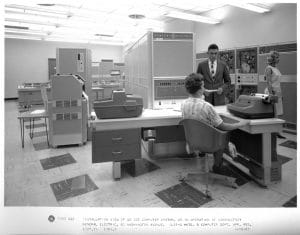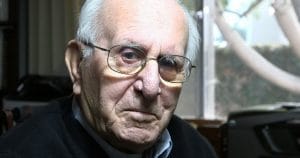Born in Ohio to Ukrainian Jewish immigrants, Spielberg had a fascination with radios, building his first receiver at 9; at 15, he built a transmitter to enable him to talk to others as a ham radio operator. With the attack on Pearl Harbor in 1941, Spielberg joined the U.S. Army Signal Corps, and although he trained as a bomber radio operator and gunner, the Army discovered he had a knack for designing airplane radio antennas, and he was promoted to Communications Chief of a B-25 Squadron. After the war he went back to school, graduating with a degree in electrical engineering, and went to work for RCA’s Advanced Development Department in 1949.

As RCA’s Manager of Advanced Product Development, Spielberg defined and managed the design of a new class of product: “point of sale” cash registers — computerized terminals that looked up prices from a central memory system, calculated tax and discounts, and checked credit status — “an online data acquisition and recording system unique for its time (1954),” notes the IEEE Computer Society, which chose Spielberg for its 2006 Computer Pioneer Award. In 1957 he was hired away by General Electric, where he led the design of the GE-225 computer, which went on the market in 1960 at $250,000, the equivalent of about $2 million today. One of the machines was installed at Dartmouth College, where it was used to create a new computer language: BASIC, which was instrumental in making computers accessible to hobbyists, leading to the personal computer revolution.

Spielberg, who retired from GE in 1991, had three daughters and one son. “I tried to get him interested in engineering,” he said of his son, “but his heart was in movies. At first I was disappointed, but then I saw how good he was in moviemaking.” Indeed his son, Steven Spielberg, is very good at making movies, including the computer-enabled Jurassic Park. During the design of the 225, “Dad explained how his computer was expected to perform,” Steven said, “but the language of computer science in those days was like Greek to me. It all seemed very exciting, but it was very much out of my reach until the 1980s, when I realized what pioneers like my dad had created were now the things I could not live without.” Arnold Spielberg died at his Los Angeles home with his children present on August 25. He was 103.
